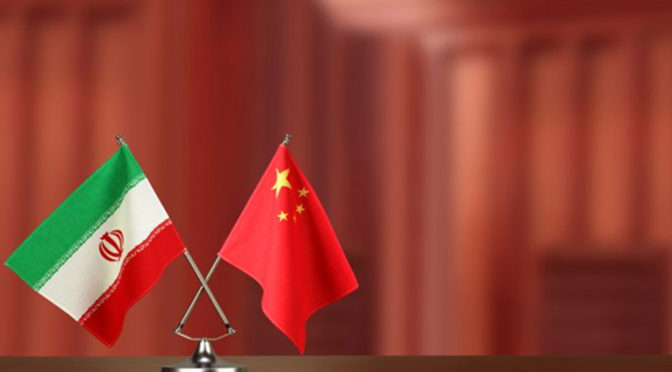China’s rising diplomacy with Iran
Posted on : May 25, 2021Author : Ankita Chatterjee

The Middle East has always been a very unstable and turbulent region. Oil, trade routes, geography and terrain, faith and ideology, all contribute to the strategic importance of the Middle East. Hence, it is no great surprise that this region is infamous for its instability and therefore, acts as a theatre of competition for great powers, especially the US, Russia and China. Iran is one of the most important and influential regional powers in the Middle East and also has been on the radar of interests of many countries desperately looking for opportunity spaces to make their presence felt in this region. One such event happened recently.
On March 27, China signed a landmark 25-year Strategic Cooperation Agreement with Iran, renewing the commitment to their Comprehensive Strategic Partnership established in 2016. The agreement was signed between the Iranian Foreign Minister Javad Zarif and his Chinese counterpart Wang Yi in Iran. News reports have claimed that the deal may be worth $400 billion of Chinese investments in Iran’s ailing economy and provide China with a source of cheap oil for the coming quarter century. Under this agreement, China plans to invest substantially in Iran’s banking, telecommunications, railways, ports, IT and healthcare for the next 25 years in return for China getting unprecedented access to Iran’s oil and gas sectors. It also calls for joint training and exercises, joint research and weapons development and intelligence sharing between China and Iran. China sees Iran as vital to its aim of getting a foothold in the region where the US has numerous military bases.
Historically, China’s relationship with Iran has been a positive, albeit a largely limited one. Iran and China have had friendly and peaceful relations for centuries and have never been at war with each other. Both the countries have enjoyed peaceful trade and cultural exchanges through the ancient Silk Road, and the Belt and Road Initiative (BRI) revived it once again. However, China has been exceedingly careful in its dealings with the turbulent Middle East; it has cautiously adhered to a balanced policy of not cozying up to Iran and maintaining an equidistant relationship with rival Gulf nations like Saudi Arabia and the United Arab Emirates (UAE). The China-Iran deal has been widely claimed as a game-changer for the region and a cornerstone for China’s footprint in West Asia.
China’s involvement as an economic actor in the Middle East has soared in recent years, especially in the wake of its Belt and Road Initiative (BRI) which also has been widening and deepening the relationship between China and the region. It can be observed that China moving closer to Iran on economic and security issues comes shortly after members of the Quadrilateral Security Dialogue — US, Japan, Australia and India — convened its first–ever summit. Beijing, through establishing strategic opportunities in its relationship with Tehran, attempts to create a ‘Balance of Power’ to protect itself and to thwart off threats from other state alliances. Iranian officials hailed the agreement to be a part of their “Look to the East” foreign policy in defiance against the US sanctions. It is also being branded as a significant step for the development of political and economic power of Iran.
What the Iran-China agreement means for India
For India, Iran is the gateway to the republics of Central Asia. So, a positive engagement with Iran is, therefore, crucial to Indian interests. The new Sino-Iran agreement denotes Iran’s increasing dependence on China, which could undermine the Indian access. Like Central Asia, Afghanistan remains accessible to India only through Iran and Pakistan. With the Pakistan route blocked to India, Iran becomes even more crucial. Hence, a China-Iran axis could thus be devastating for India’s engagement with Central Asia. The Strategic Cooperation Agreement symbolizes a strong growing synergy between China and Iran. So, India must rethink its Iran policy if it wishes to limit China’s growing influence on Iran, restrain Tehran’s increasing dependence on Beijing and consider new channels of outreach to Iran. The sanctions imposed by the US combined with the COVID-19 has yielded greater economic pressure on Iran and its economy is in decline ever since. In this scenario, India can position itself as a major partner of Iran and maintain its advantage over China as well.
Possible impact of the China-Iran agreement on the US
The signing of the 25-year cooperation agreement between the US-sanctioned Iran and US-pressured China places a new strategic restraint in the Middle East for the US and its allies. The expansion of China’s military assistance, training and intelligence-sharing with Iran will also be viewed with alarm by the US. American warships already tangle regularly with Iranian forces in the waters of the Persian Gulf and challenge China’s internationally disputed claim to much of the South China sea and the Pentagon has declared China an adversary. Moving ahead with a broad investment program in Iran was perhaps indicative of Beijing’s growing impatience with the erstwhile Trump administration after its renunciation of the nuclear agreement with Iran.
Iran’s economy has steadily declined since the former U.S. President Donald Trump withdrew from the Iran nuclear deal, the Joint Comprehensive Plan of Action (JCPOA), in 2018. Tehran is experiencing a widening trade deficit, high inflation and a weak currency, rising unemployment, and a growing fiscal deficit. Sanction relief is, therefore, key for Tehran, and re-negotiating the nuclear deal is the first step toward this. Besides, with impending elections in June this year, Iran is still working on how to go ahead with the Biden administration.
Conclusion
The Persian Gulf has emerged as a new theatre of the U.S-China great power competition. China, through its Belt and Road Initiative (BRI) hopes to reduce tensions in the Middle East. Iran is likely to enhance its engagement with China’s Belt and Road Initiative (BRI) now. Beijing with the help of this agreement will attempt to deepen its strategic involvement in the region, improving its diplomatic and economic influence across the Middle East. However, this deal with China has garnered mixed reactions within Iran. On the one hand, some Iranians protested against the agreement saying that Iran was selling its sovereignty to China. On the other hand, the Iranian supporters of the strategic partnership say that Iran, weakened by US sanctions and diplomatic isolation, is hungry for a new way forward in which China poses as a potential partner. Furthermore, Iran could use the “China Card ” for leverage in the US-Iran relations and until the sanctions are lifted, this deal is viewed as the best option.
References
Ankita Chatterjee,
Intern, Asia in Global Affairs





Leave a Reply